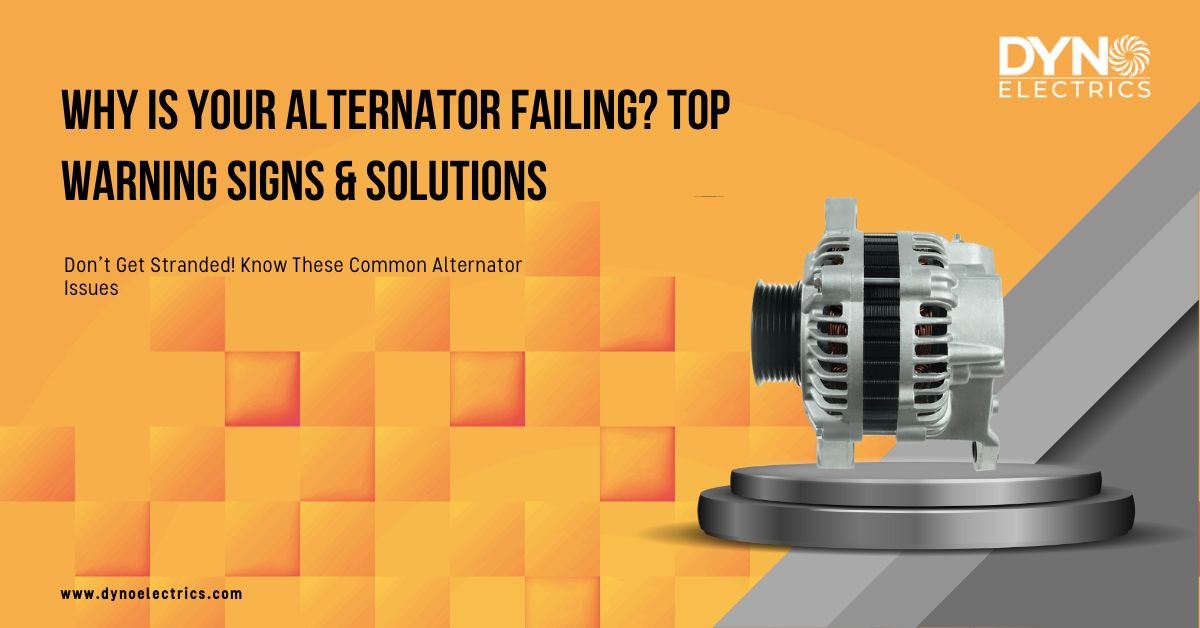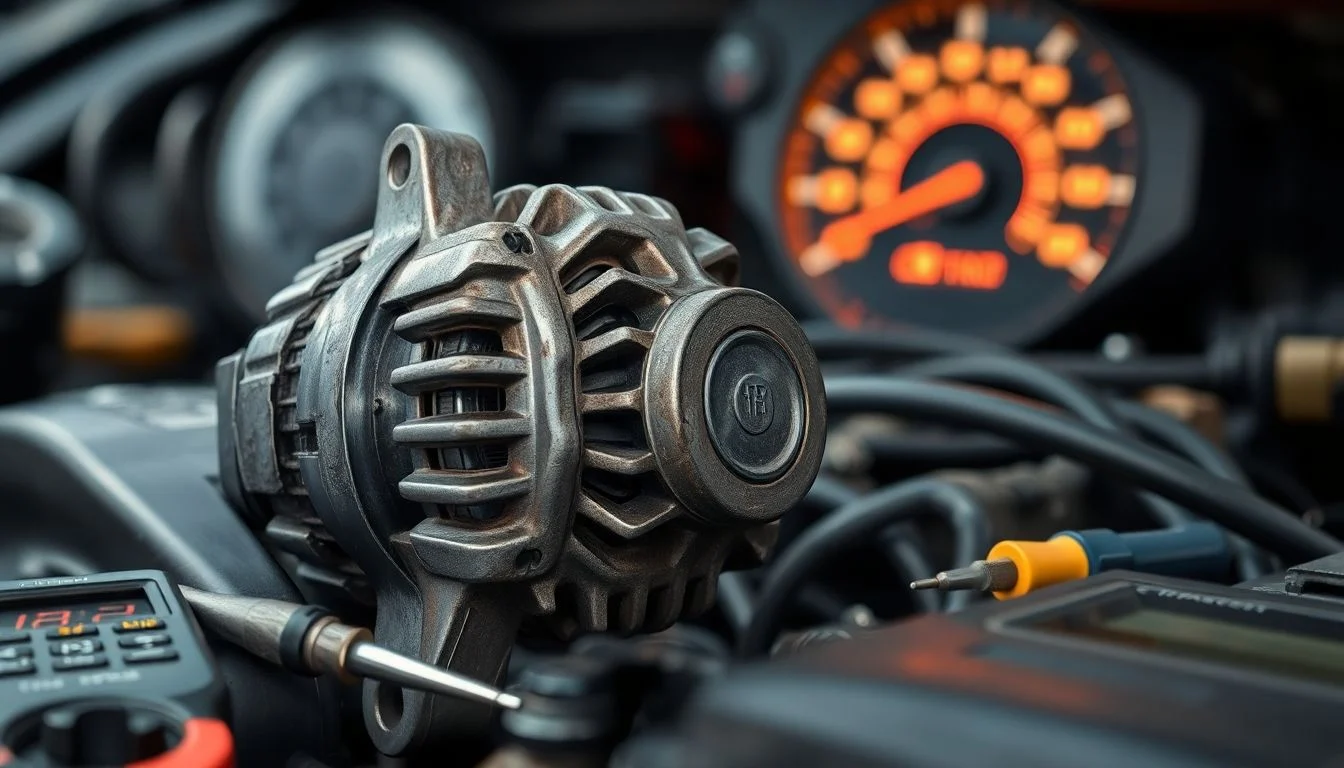
Introduction
The alternator is a vital part of your vehicle’s electrical system. It powers everything from the headlights to your car’s computer while charging the battery. When it starts to fail, your car may act up, or worse, break down unexpectedly. Many people ignore small signs, only to find themselves stuck on the side of the road later. Did you know that around 30% of all vehicle breakdowns are caused by alternator issues? Catching problems early can save you hundreds of dollars in repair costs. In this article, you’ll learn what to watch for, what causes alternator failure, how to diagnose problems, and what steps to take to keep your car running strong.
What Is an Alternator and How Does It Work?
Understanding the Alternator’s Role in Your Vehicle
The alternator is like your car’s heartbeat—producing the electrical power your vehicle needs to run. It takes the engine’s mechanical energy and turns it into electricity. This power charges the battery and keeps your lights, radio, and other electrical parts working properly. Without a healthy alternator, your battery can quickly drain, leaving you stranded.
Components of an Alternator
Several key parts come together to make an alternator work:
- Diodes: Convert AC power to DC power your car uses.
- Rotor: Spins inside the alternator, creating a magnetic field.
- Stator: Stationary part that interacts with the rotor to produce electricity.
- Voltage Regulator: Keeps electrical output steady to prevent overcharging or undercharging.
How Alternator Failures Occur
Most failures are caused by wear and tear. Over time, parts can break down or become less efficient. External factors like excessive heat, corrosion, and mechanical damage can accelerate this process. If the alternator isn’t maintained, it’s more likely to give out suddenly.
Top Signs Your Alternator Is Failing

Dimming or Flickering Headlights
Notice your headlights getting dim or flickering? That’s a common sign your alternator isn’t supplying steady power. Fluctuations in lighting can happen when the alternator’s output drops below what’s needed.
Battery Warning Light Activation
When your dashboard shows a battery-shaped warning light, it’s time to pay attention. This light often appears when the alternator isn’t charging the battery properly. Ignoring it can lead to a dead battery and a stranded car.
Dead or Weak Battery
If your battery keeps losing its charge despite being new, the alternator might be the culprit. A failing alternator can’t recharge the battery fully, leading to repeated starting problems.
Electrical Failures and Malfunctions
Other electrical issues can also point to alternator trouble. Expect problems like your radio cutting out, windows not rolling down, or climate controls acting up. Unexpected shutdowns of your vehicle can also occur.
Strange Noises from the Engine Bay
A squealing noise when starting your car? That could be your belt slipping or a worn bearing inside the alternator. Grinding sounds might mean internal components are damaged and need attention.
Frequent Stalling or Difficulty Starting
If your car stalls often or you struggle to get it started, inadequate electrical power might be the cause. This can happen when the alternator isn’t generating enough energy to keep things running.
Common Causes of Alternator Failure
Worn or Broken Belt
The belt links the alternator to your engine. Over time, it can slip, crack, or break, stopping the alternator from working efficiently. Regular belt inspections are crucial.
Faulty Voltage Regulator
The regulator controls the amount of electricity the alternator produces. A bad regulator can cause overcharging, which damages your electrical system, or undercharging, which drains the battery.
Corrosion and Wear
Environmental factors like moisture and road salt can corrode electrical connections. Corrosion leads to poor conductivity or complete failure if not cleaned regularly.
Overloading Electrical System
Adding too many aftermarket electronics or keeping all accessories on can overload the alternator. It can wear out faster if forced to supply more power than it was designed for.
Heat and Mechanical Damage
Excessive engine heat can cause parts inside the alternator to expand and fail. Physical impacts, like hitting a curb or accident, can also damage internal components.
Solutions and Preventative Measures
Repair or Replacement Options
Most times, a failing alternator needs replacing. Repairs might be possible if only a part like a diode or voltage regulator is defective. Expect to pay $200–$600 depending on your vehicle and part quality.
Regular Maintenance Tips
- Check your belt tension and condition every 20,000 miles.
- Clean electrical connections to prevent corrosion.
- Keep an eye on dashboard warnings.
Upgrading Components
For cars with increased power needs, like upgraded stereo systems, consider a high-output alternator. Upgrade regulators for better voltage control.
Extending Alternator Lifespan
Consistent maintenance and keeping your vehicle cool can make your alternator last longer. Watch for early signs of wear, so you can act before major failure occurs.
When to Consult a Professional
If you notice persistent electrical issues or can’t diagnose the problem yourself, it’s wise to see an expert. A trusted mechanic can run detailed tests and get your vehicle back on the road fast. Don’t ignore warning lights—they’re your first clue to bigger trouble.
Conclusion
Alternator failure often shows clear warning signs like dim lights, warning lights, and electrical glitches. Understanding the causes—from worn belts to corrosion—helps you catch problems early. Regular inspections and maintenance are key to avoiding costly repairs. Keep an eye on your vehicle’s electrical health, and don’t hesitate to seek professional help if needed. Staying ahead of alternator trouble keeps your vehicle reliable and safe for the long haul.
